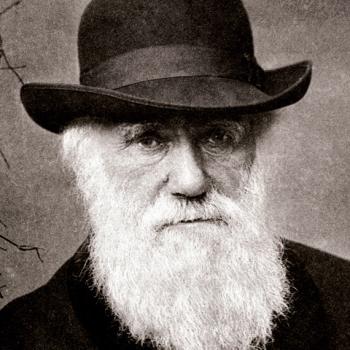
***
Douglas Axe received superb training in engineering and molecular biology. After completing undergraduate work at the University of California at Berkeley and earning his doctorate at Caltech (the California Institute of Technology), he went on to post-doctoral work and then to a research scientist position, both at the University of Cambridge in the United Kingdom.
I’ll be extracting some notes from his book Undeniable: How Biology Confirms Our Intuition That Life Is Designed (New York: HarperCollins, 2016):
First, he cites a Wall Street Journal article by the Berkeley psychology professor Alison Gopnik:
“By elementary-school age,” she wrote, “children start to invoke an ultimate God-like designer to explain the complexity of the world around them — even children brought up as atheists.” In fact, Deborah Kelemen, a psychology professor at Boston University, found that even highly trained scientists are unable to fully rid themselves of the innate impression that there is purpose underlying the living world. According to her, “Even though advanced scientific training can reduce acceptance of scientifically inaccurate teleological explanations, it cannot erase a tenacious early-emerging human tendency to find purpose in nature.” (19)
How horrible!
I’m reminded of the anthropologist Stewart Elliott Guthrie’s 1993 book Faces in the Clouds: A New Theory of Religion, in which he argued that religion is a “systematic anthropomorphism” because our evolutionary development encouraged us to be quick at detecting “agents” — e.g., predators — for the sake of survival and avoiding danger. That’s why we can so easily see “faces” in clouds and other random patterns. If a tiger was lurking in the grass, those who could pick its face out quickly had better chances of living through the day. So we impute agency, personality, and purpose to nature.
There are, of course, at least two diametrically opposed ways of viewing this sort of thing.
One way is to regard religion as reflecting the hypertrophy of what was once, but presumably is no longer, an evolved attribute that conferred survival advantage (and, thus, reproductive advantage). It’s something that, since we’re no longer primitive hunters and gatherers, we should now try to outgrow. (One advocate of that view regularly comments here on this blog.)
Another way is to regard theism as the natural tendency of a normally functioning human intelligence — and to see this as a good thing, perhaps even divinely bestowed.
One loser in this regard, as in others, is poor Sigmund Freud, who insisted that religion is not only an “illusion” but a disease, a “collective neurosis.” (Evidence that religious belief and affiliation are actually, literally, healthy has been accumulating for years, and Freud’s notions haven’t stood the test of time very well.)
But back to Douglas Axe, who quotes the first-century Greek historian Plutarch (from an essay titled Fortune [aka “Chance”] as expressing an intuitive sense of design in nature:
But can it be that those things which are most important and most essential for happiness do not call for intelligence, nor have any part in the processes of reason and forethought? Nobody wets clay with water and leaves it, assuming that by chance and accidentally there will be bricks, nor after providing himself with wool and leather does he sit down with a prayer to Chance that they turn into a cloak and shoes for him. (22)
A passage from Keith Ward, Why There Almost Certainly Is a God: Doubting Dawkins (Oxford: Lion, 2008), 22-23:
[T]he existence of conscious minds introduces a new form of non-scientific explanations for why things happen as they do. Scientific explanation, in general, works by referring to some initial state (a ’cause’) and a general mathematically describable law. That law predicts what regularly follows from the initial state, and it does so without any reference to purpose, value or consciousness.
But there is another sort of explanation. The Oxford philosopher Richard Swinburne (Dawkins wrongly calls him a theologian, probably because he disagrees with him so much) calls it ‘personal explanation’. It only comes into effect when persons, or conscious minds, exist. Then it explains some of the things that persons do in terms of knowledge, desire, intention and enjoyment.
If you want to explain how it is that I am writing these words, you could do so by showing that I am aware of some possible future states (I can stay in bed, have a coffee, or write these words), I evaluate one of them as desirable (I want to finish this book), I set in motion a causal process to bring about what I desire (I get out of bed), and finally I enjoy what I am doing, because it is what I wanted and desired to do.
This is personal explanation. It is a perfectly satisfactory form of explanation, and it does not seem to be reducible to scientific explanation. If it is, no one has yet plausibly suggested any idea of how to reduce it. How can my talk of knowledge, desires, intentions and awareness translate into statements of physics that only refer to physical states and general laws of their behaviour?
I conclude, like most philosophers, that if conscious knowledge, desire, intention and enjoyment exist, then personal explanation is a sort of explanation that we need, one that is truly explanatory, that is quite different from scientific (purely physical) explanation, and that is not reducible to or translatable into scientific explanation.
I do not think Dawkins agrees with this. I was flattered to find myself mentioned in his book, but puzzled when he said, ‘Like Swinburne, Ward mistakes what it means to explain something.’ However, Swinburne and I are not making a mistake. We are claiming that there is more than one sort of explanation for why things happen as they do. Scientific explanation in terms of physical causes and general laws is one sort of explanation. Personal explanation in terms of desires and intentions is another.
From Huston Smith, Beyond the Post-Modern Mind, rev. ed. (Wheaton, IL: The Theosophical Publishing House, 1989), 118:
To set out to reverse the metaphysical momentum of the last four hundred years might seem a task so difficult as to be daunting, but there is another way to look at the matter. Here, surely, is something worth doing, a project to elicit the best that is within us, including resources we might not know we possess; so even if we fail in the attempt we shall do so knowing the joy that comes from noble doings. To get the project underway we must advance into enemy territory — we shall find it to be a contemporary form of what Plato called “upside down existence” — and to do this we must cross a no-man’s-land of methodology, “no-man’s” being precise here because if either side were to capture it the victory would be theirs. . . .
In a university setting, any move to reinstate the enchanted garden can expect to be met by the question, “How do you know it is enchanted?” If we answer that we experience it so, that we find ourselves ravished by its mystery and washed by its beauty and presences — not always, of course, but enough to sustain conviction — we shall be told that this is not to know, it is merely to feel. . . .
This positivistic definition of knowledge, Smith writes, shows a
willingness to dignify as knowledge only such kinds as hold the promise of augmenting our power to control, [and thus] rules out the very possibility of knowing things that might be superior to us, it being possible to control only subordinates or at most equals; in a word, it rules out the possibility of knowing transcendence.
Smith quotes the late great Caltech theoretical physicist Richard Feynman as saying in his 1965 Nobel Prize lecture that “a very great deal more truth can become known than can be proven.” (119)
Smith suggests that the watchword of the humanities ought to be “Not to prove, but to discover.” (119)
Posted from St. George, Utah












